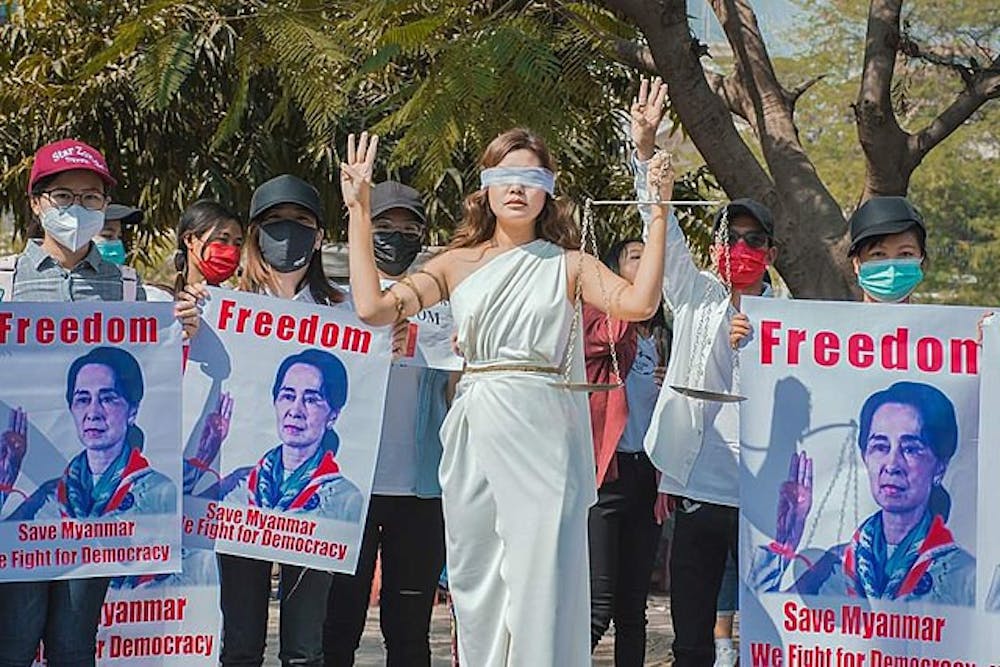On Feb. 1, Myanmar citizens woke up with no Internet and their phone lines cut off. A military televised program later informed the public that Aung San Suu Kyi, Myanmar’s state counselor and civilian leader, had been detained and charged under counts of voter fraud in the recent November democratic elections. The military had staged a coup, and Senior General Min Aung Hlaing had taken charge for a year-long state of emergency.
Myanmar, formerly known as Burma, has been plagued by “military rule, civil war, isolation from global affairs and widespread poverty,” since it initially gained independence from colonial rule in 1948, according to the Council on Foreign Relations. After a 14-year period of representative democracy under the Union of Burma, General U Ne Win led the nation’s first military coup and established a constitution of isolation policies and socialist economics in 1974.
Since then, Myanmar has seen several periods of upheaval, including both democratic and military-dominant governments, civilian protests and attempts to build stronger relationships with foreign countries. 2015 saw the nation’s first democratic election, with the National League for Democracy winning majorities in both parliamentary chambers and appointing Suu Kyi to the position of state counselor.
Myanmar held its second national election Nov. 8, 2020 and the NLD party won by a landslide. Military leaders, worried about their declining power, alleged voter fraud.
“Nobody believed them, obviously,” said an alum who is a Myanmar citizen and who requested anonymity due to safety concerns. “The military and their backed party lost pathetically and like all autocratic idiots, they shouted and screamed voter fraud.”
While most citizens of Myanmar hoped the election had been won and over with, there had been a long-time political crisis brewing behind the scenes.
“There were a lot of rumors during the weeks leading up to the coup saying that the military might try to stage something,” the alum said. “In one press conference, a military spokesperson said they had not ruled out a coup in response to voter fraud allegations.”
“I remember having lunch with a family friend who is a lawyer and was one of the candidates during the elections, and I remember my dad asking him, ‘Oh my God, is there going to be a coup?’” said Thin Su ’22, who is currently studying in Myanmar. “That was the first time I heard the rumors, but I remember thinking there was no way the military would try to reverse all the progress Myanmar had done. It would be such a waste of time.”
While the military maintains that voter fraud was the reason for the coup, many believe there were other motives.
“The real reason is that the military is an ideologically dogmatic institution. They have ruled this country for decades and believe they are the guardians and heartbeat of the nation, not just a professional army,” the alum said. “They are truly scared that if the pro-democratic party won another term, they would be obliterated from the political space.”
Others believe that the coup was inspired by General Min Aung Hlaing’s long-held private hopes of ruling as president, according to Al Jazeera.
The coup officially took place Feb. 1, with the military arresting Suu Kyi, placing NLD leaders under house arrest and cutting off Internet and phone access for Myanmar’s civilian population.
“I was awakened on Feb. 1 by the sound of my mom on the phone with my uncle. I heard my mom’s voice faintly through my bedroom door saying, ‘They’ve detained Daw Aung San Suu Kyi?’ I was half asleep, but as soon as I heard those words, I felt my heart sink,” a first-year studying remotely in Myanmar, who asked to remain anonymous due to fears of military repercussions, wrote in an email to The Herald. She knew “that things were about to change, most likely for the worst … On that first day, what I felt was mostly confusion and anxiety for what’s more to come.”
The alum, who experienced one of Myanmar’s military dictatorships during his childhood, said he “was in disbelief, really.”
“I got to enjoy two terms of a democratic system,” he said. “Having all of that 10 years of joy and optimism taken away within one morning was just utter shock and disbelief for everyone.”
Civilian protests began almost instantaneously, and are the largest seen in the nation since the 2007 Saffron Revolution, which were led by Buddhist monks and catalyzed by hikes in fuel prices. For the first month, protests were largely peaceful, fueled by a sense of “exuberance” and “jubilation,” the alum said.
But after about a month, with civilian hope starting to wane, the military began using crackdown methods to stop protests, he added. The military now holds the power to stop, arrest and kill civilians with impunity.
“At first, they used crowd dispersal methods, using water cannons, and then rubber bullets, and then real bullets, sound grenades, all types of grenades,” Su said. “There are no more protests anymore. As soon as some break out, shootings start right away.”
Past resistance strategies such as the banging of pots and pans at night have entirely halted because of the military crackdown. The military has also begun burning neighborhoods, usually home to squatters with little money, according to Su.
As a result of these crackdowns, Myanmar has seen a death toll of nearly 600 civilian lives as of Wednesday. Even more deaths remain unreported and unverified in rural areas.
“The mood has changed dramatically in the past month, from one of excitement and optimism to one that is filled with fear and hatred and anger,” the alum said.
Myanmar’s people are still managing to protest in their own ways. Many have stopped supporting businesses affiliated with the military, harming the nation’s economy. Others have used social media as a tool for spreading awareness.
“I involve myself in a lot of freelance journalism work for international publications,” the alum said. Outside reporters “are not allowed in the country and it is important for them to know what is happening, so I do a lot of connecting people with people.”
Many living in Myanmar remain under immense stress. People have begun to lose a sense of normalcy, often fearing for their lives when leaving their homes and lacking international support.
“I think I speak for the majority of us in Myanmar when I say we are unable to go to bed peacefully each night with the fear that shootings will begin, a fire will start or even worse, soldiers will break in and arrest us without a need for a warrant,” the anonymous student wrote. “Our minds and bodies have been in a constant state of alert and stress since Feb. 1, and our hearts are heavy as we witness our brothers and sisters courageously sacrifice their lives for the future of our country.”
Su added that she has lost a grasp on what was once normal before the coup.
“I don’t even remember what it's like to go to sleep with Netflix on because when I go to bed, the internet's already cut off,” she said. “There’s tiny little things that you miss.”
Su’s largest sense of support has come from her best friend, who is also currently in Mandalay. “We talk over the phone and I guess we’re therapy to each other, because it's really hard to explain what you're going through to a foreigner, especially to explain what loss you feel.”
Internet access has been cut off almost entirely across Myanmar. The military has banned all social media platforms such as Facebook, Instagram, Twitter and WhatsApp. Soon after the initial coup, it also prohibited the use of mobile data. Just last week, it banned broadband Wi-Fi. The only Internet connection that remains is the expensive and rare fiber internet, which gets cut off between 1 a.m. and 9 a.m. every day.
For Brown students studying remotely in Myanmar, these Internet restrictions have made remote learning especially difficult, even though professors have provided accommodations.
“As soon as I woke up on Feb. 1 and received the news, I immediately emailed all my professors explaining the situation … They all replied quickly with words of support and understanding,” the anonymous student wrote, adding that she also received a dean’s note. “Overall, I feel a lot of support from my peers and my professors, and I am very grateful for that.”
As for the broader Brown community, students in Myanmar urge students to raise awareness on the injustices happening in the country. “If there’s anything I can urge people to do, it’s to learn more about the situation,” Su said.
There have been similar calls for support among the international community. Many Myanmar citizens remain hopeful that the United Nations will intervene, but China and Russia’s veto powers make it unlikely that any action will be taken before the nation possibly erupts into civil war, wrote Nina Tannenwald, professor of political science, in an email to The Herald.
“The Myanmar coup is a real challenge for the international community’s principle of ‘responsibility to protect,’” Tannenwald wrote. “Steps that the international community should take include targeted economic sanctions against members of the Myanmar military and the military’s economic enterprises, a total arms embargo and referral of military leaders to the International Criminal Court for crimes against humanity.”
As for the future of Myanmar, many hope that the conflict will eventually resolve in a democratically-elected government, with the military entirely disappearing from the political realm.
“I want to see Myanmar become like the United States, have a professional army, be very prosperous and be economically, politically and socially advanced,” the alum said. “The immediate aims of this revolution are quite simple: to topple the military dictatorship to form a federal system of government that is very much similar to what is there in the United States, and ultimately, to also have civilian oversight of all of the security apparatus, which is something that we have not had since 1962.”
The younger Myanmar generation also hopes that the current conflict will lead to resolutions with the nation’s historic ethnic tensions, as many of the ethnic groups in Myanmar, including Indian, Chinese and Rakhine people, have faced long-time systematic discrimination.
“We want whatever new government is coming in to make sure that they recognize these ethnically diverse groups as well, and give them whatever administrative freedom that they deserve,” Su said. “This racism cannot go on any longer.”
Clarification: A previous version of this article stated that the death toll in Myanmar was over 300 civilian lives, a number that was reported March 26. The article has been updated with a more recent estimate from April 7.
Editor’s note: Due to personal safety concerns, this article has been updated to grant anonymity to one of the sources included.

Alex Nadirashvili was the managing editor of multimedia and social media for The Brown Daily Herald's 133rd Editorial Board. As a former University News editor, he covered faculty, higher education and student life, though his proudest legacy is The Brown Daily Herald TikTok account.





